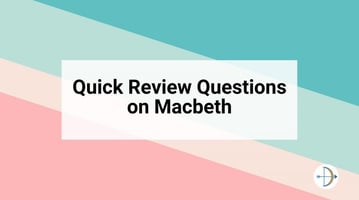Quick recap questions on Macbeth, five for each scene.
Worth Knowing: 10 Classical Allusions
Allusions can help students thrive in English, as Matthew Pinkett points out in his post here – read it you haven’t already because it’s excellent. With that in mind, I thought I’d share ten classical allusions that I think are helpful for students to know and be able to reference. Happy reading –
Gordian Knot
An intricate knot, seemingly impossible to untangle. Useful for emphasising obtrusive complexity: The Gordian nature of the problem seemed insurmountable.
Sword of Damocles
A sword that dangled over King Dionysius’s throne by a single horse hair. Useful for conveying the oppressive feeling of an impending sense of doom: The deadline hung over her like the Sword of Damocles.
Delphic Oracle
In his temple in Delphi, Apollo conveyed cryptic prophecies through an oracle. Useful for describing predictions or messages that are challengingly obscure: The Delphic nature of the HMI’s feedback left the Head confused about the exact nature of the identified areas for improvement.
Pandora’s Box
A box that once contained all the evils of the world. Useful for highlighting the far-reaching and troubling consequences of a seemingly innocuous action: A closer examination of departmental expenditure opened a Pandora’s Box of fiscal horrors.
Deus ex Machina
A plot device that brings an immediate and unlikely resolution to a narrative. Useful for highlighting where a seemingly unsolvable situation has been brought to a surprisingly happy conclusion: The deus ex machina took the form of an innocuous phone call during which the Ofsted Inspector cancelled the forthcoming inspection because her car had broken-down.
Sisyphus
The father of Odysseus, forced to endlessly roll a boulder up a hill only to watch it roll back down. Useful for illustrating a task’s futility: Enforcing the new behaviour for learning policy was a Sisyphean task.
Dionysus
The Greek god of, amongst other things, wine. Useful for emphasising hedonism and excess: The Dionysian celebrations of the maths staff resulted in some sore heads the next morning.
Cassandra
The daughter of King Priam, gifted with the ability to prophesise, but also cursed never to be believed. Useful for drawing attention to the uncanny ability that some possess to predict disastrous events that appear unlikely: Speaking with Cassandra’s voice, Mrs Jones stated confidently that she didn’t expect the targets to be met.
Icarus
The son of Daedalus who flew too close to the sun. Useful for highlighting the perils of excessive ambition: Like Icarus, the new Head had a grand plan that she hoped to fulfil.
Proteus
An ancient deity and protector of the seas who possessed the ability to transform into different shapes and forms. Useful for indicating rapid, mercurial changeability: The protean shifts in education policy over the years have been dizzying.


.jpg?width=50&name=douglas-wise%20(2).jpg)




